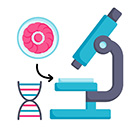Does Taking Testosterone Make You Infertile?
If you’re thinking about taking testosterone—whether for low energy, muscle gains, or a medical condition—you might have heard whispers that it could mess with your ability to have kids. So, does taking testosterone make you infertile? The quick answer is: yes, it can, but it’s not always a permanent deal. This article is your go-to guide on how testosterone impacts fertility, what science says, and what you can do about it. We’ll cover the basics, dig into stuff other articles skip, and give you practical tips to keep your options open if kids are in your future.
What’s Testosterone All About?
Testosterone 101
Testosterone is the hormone that makes guys, well, guys. It’s mostly made in your testicles and powers things like your deep voice, beard growth, and muscle strength. But it’s not just about looking tough—it also keeps your bones strong, helps make red blood cells, and fires up your sex drive.
How Your Body Makes It
Your body has a cool system to keep testosterone levels just right. Here’s the rundown:
-
- Your brain’s hypothalamus (think of it as the boss) sends a signal called GnRH.
-
- That signal hits the pituitary gland (the middle manager), which pumps out two hormones: LH and FSH.
-
- LH tells your testicles to whip up testosterone, while FSH helps make sperm.
-
- When testosterone levels are good, your brain gets the memo and dials back the signals—like a thermostat keeping the room comfy.
Why People Take Testosterone
Some guys need extra testosterone because their bodies don’t make enough. This could be from:
-
- Low T (Hypogonadism): When natural levels are too low, causing tiredness or weak muscles.
-
- Late Puberty: To kickstart development in teens.
-
- Health Issues: Like muscle loss from HIV or cancer.
Others might take it to bulk up for sports or the gym, but heads up—that’s not doctor-approved and can get risky.
How Testosterone Messes With Fertility
The Big Connection
Here’s the deal: taking testosterone can make you infertile. Why? When you add extra testosterone from shots, gels, or pills, your body goes, “Whoa, we’re overflowing!” It then tells your brain to stop sending LH and FSH signals. No signals, no natural testosterone, and—here’s the kicker—no sperm production either. It’s like flooding a garden with water; too much drowns the plants instead of helping them grow.
What Happens Inside
Let’s break it down step-by-step:
-
- Sperm Production Shuts Down: Extra testosterone tricks your brain into thinking you’ve got enough hormones, so it stops telling your testicles to make sperm.
-
- Testicles Take a Break: With no work to do, your testicles might shrink a bit—less action means less size.
-
- Sperm Count Drops: Research shows some guys on testosterone therapy end up with zero sperm in their semen after a few months.
A study in the Journal of Clinical Endocrinology & Metabolism found that 65% of men on testosterone had no sperm after 6 months. That’s a big deal if you’re planning a family!
Temporary or Forever?
Good news: infertility from testosterone isn’t always permanent. If you stop taking it, your body might start making sperm again—usually in 3-6 months, though it could take longer. But here’s the catch: long-term use or super-high doses might damage your system for good. It’s a roll of the dice, and not everyone wins.
Signs Something’s Up
Changes You Can Spot
If you’re on testosterone and worried about fertility, keep an eye out for:
-
- Smaller Testicles: They might feel softer or tinier than before.
-
- Less Semen: Ejaculating less fluid than usual could mean lower sperm output.
-
- Weird Sex Drive: Too much testosterone can sometimes tank your libido, which is ironic, right?
How It Hits Your Head
Fertility worries don’t just stay physical—they can mess with your mind too:
-
- Stress: Freaking out about not having kids someday.
-
- Feeling Low: It can bum you out or make you question yourself.
-
- Partner Tension: If you and your partner aren’t on the same page, it can get rocky.
If this sounds like you, don’t bottle it up—chat with a friend, your partner, or even a counselor.
Figuring It Out: Tests You Can Do
How to Check Your Fertility
Wondering if testosterone’s already affected you? Get these tests:
-
- Semen Analysis: A lab looks at your sperm count, how they move, and their shape.
-
- Blood Tests: Checks your testosterone, LH, and FSH levels to see what’s off.
-
- Physical Check: A doctor feels your testicles to see if they’re smaller or softer.
It’s simple and gives you real answers fast.
When to Call a Doctor
Don’t wait if:
-
- ✔️ You’ve been trying to have a baby for 6-12 months with no luck.
-
- ✔️ Your testicles feel different or you notice less semen.
-
- ✔️ You’re about to start testosterone and want kids later.
Acting early can save you headaches down the road.
What You Can Do About It
Quitting Testosterone
If you’re on testosterone and want to boost your fertility, stepping away might help. But don’t just stop out of nowhere—talk to your doctor about easing off slowly. Your sperm production could start creeping back in 3-6 months, though it varies guy to guy.
Other Fixes
Need testosterone for health reasons but still want kids? Try these:
-
- Clomiphene Citrate: A pill that boosts your natural testosterone without trashing sperm.
-
- hCG Shots: These mimic LH to wake up your testicles and keep sperm coming.
-
- Aromatase Inhibitors: Balance your hormones so sperm don’t take a hit.
These aren’t magic bullets, but they’re worth asking your doctor about.
Everyday Boosts
Help your fertility with some simple changes:
-
- ✔️ Eat Smart: Load up on fruits, veggies, chicken, and whole grains.
-
- ✔️ Move More: Exercise keeps you healthy, but don’t overtrain—it can backfire.
-
- ✔️ Sleep Well: Aim for 7-9 hours to keep your hormones happy.
-
- ❌ Skip the Bad Stuff: Cut alcohol, ditch cigarettes, and say no to steroids.
Think of your body like a car—give it good fuel and maintenance, and it’ll run smooth.
How to Play It Safe
Using Testosterone Wisely
If you’re going to take testosterone, do it right:
-
- ✔️ Stick to a doctor’s plan—no DIY dosing.
-
- ✔️ Use the smallest amount that works.
-
- ✔️ Check in with your doc regularly to stay on track.
Saving Your Sperm
Want kids later but need testosterone now? Here’s how to prep:
-
- Sperm Banking: Freeze your sperm before starting—it’s like a backup plan.
-
- Testicular Sperm Extraction (TESE): If sperm’s low later, doctors can grab it straight from your testicles.
It’s smart to think ahead, especially if family’s on your radar.
Talk to Your Doctor
Don’t be shy—ask stuff like:
-
- “How can I take testosterone without hurting my fertility?”
-
- “What’s the best way to save my sperm?”
A good doctor will break it down and help you decide.
Busting Myths About Testosterone and Fertility
Stuff You Might’ve Heard
There’s a lot of noise out there—let’s clear it up:
-
- Myth: “Testosterone boosters won’t touch my fertility.”
-
- Truth: Even over-the-counter stuff can mess with sperm—don’t trust the label.
-
- Myth: “Testosterone boosters won’t touch my fertility.”
-
- Myth: “Only shots hurt fertility, not gels.”
-
- Truth: Any form—shots, gels, patches—can hit your sperm count.
-
- Myth: “Only shots hurt fertility, not gels.”
-
- Myth: “I’ll bounce back right after I stop.”
-
- Truth: It might take months, and sometimes it doesn’t fully come back.
-
- Myth: “I’ll bounce back right after I stop.”
Stick to the Facts
Skip the gym bro advice. Check legit sources like the American Urological Association or your doctor instead.
Beyond Fertility: What Else Could Happen?
Other Health Risks
Testosterone isn’t just about sperm—it can shake up your whole body:
-
- Heart Trouble: Some studies tie it to higher risks of heart attacks or strokes.
-
- Prostate Problems: It might make your prostate grow or raise cancer odds.
-
- Mood Rollercoaster: Too much can make you cranky or wired.
Fertility’s just one piece—keep an eye on the big picture.
How It Hits Your Life
Struggling with fertility can ripple out:
-
- Relationship Strain: If you’re not talking, it builds walls.
-
- Feeling Alone: Worrying solo makes it worse.
-
- Bedroom Blues: Stress can throw off your game.
Stay connected—talk it out with your partner or a pro if it gets heavy.
Real-Life Examples (Made Simple)
Jake’s Story: A Comeback
Jake, 28, started testosterone shots for low energy. A year in, he and his girlfriend couldn’t get pregnant. Tests showed zero sperm. He worked with his doctor, stopped the shots, and tried hCG. Nine months later, his sperm was back enough for them to try IVF. Takeaway? Don’t wait to get help.
Ethan’s Regret
Ethan, 40, used testosterone for years to stay ripped. When he decided he wanted kids, his sperm count was shot—and it didn’t recover much after quitting. He wishes he’d frozen sperm early. Takeaway? Think long-term before you start.
Extra Stuff You Won’t Find Everywhere
New Research to Know
A 2022 study in Fertility and Sterility found that men who used low-dose testosterone gels (instead of high-dose shots) had a better shot at keeping some sperm production—about 30% didn’t hit zero. It’s not a green light, but it hints that how you take testosterone matters. Ask your doctor if lower doses could work for you.
Underrated Fertility Killers
Most articles skip this, but other things can stack with testosterone to hurt fertility:
-
- Heat: Hot tubs or tight underwear can cook your sperm—keep it cool down there.
-
- Stress: High cortisol levels (from stress) can tank testosterone and sperm naturally.
-
- Medications: Some antidepressants or hair loss drugs sneakily lower fertility too.
Tackle these, and you’ll give your sperm a fighting chance.
Tech to the Rescue
Ever heard of at-home sperm tests? New kits let you check your count with a smartphone app. They’re not as good as a lab, but they’re a quick way to spot trouble early. Look for brands like YO or Trak—around $50-$100 a pop.
Where to Turn for Help
People Who Know Stuff
Need support? Hit up:
-
- Your regular doctor or a urologist (a guy-health expert).
-
- Fertility clinics—they help men, not just women.
-
- Guy-focused support groups—online or in person.
Online Goldmines
Check out:
-
- American Urological Association for solid info.
-
- Resolve: The National Infertility Association for fertility tips.
Wrapping It Up
So, does taking testosterone make you infertile? Yup, it can—and often does—by slamming the brakes on sperm production. But it’s not always game over. Stop early, try alternatives, or bank your sperm, and you’ve got options. Whether you’re just curious or already on testosterone, talk to your doctor, know the risks, and take steps now. Your future family might depend on it.
Test Your Know-How
Think you’ve got this down? Try this quick quiz:
-
- True or False: Testosterone always makes you infertile forever.
-
- True / False
-
- True or False: Testosterone always makes you infertile forever.
-
- What’s a smart move before starting testosterone if you want kids?
-
- A) Take more testosterone
-
- B) Freeze your sperm
-
- C) Wait and see
-
- What’s a smart move before starting testosterone if you want kids?
-
- How long might sperm take to come back after quitting testosterone?
-
- A) A week
-
- B) 3-6 months
-
- C) Never
-
- How long might sperm take to come back after quitting testosterone?
Answers:
-
- False—it can be temporary.
-
- B) Freeze your sperm.
-
- B) 3-6 months (or more for some).
Got questions? Drop them in the comments—we’ll tackle them for you! Stay sharp and take charge of your health.








